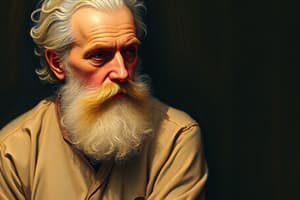Podcast
Questions and Answers
What are self-actualization needs primarily focused on?
What are self-actualization needs primarily focused on?
- Realization of one’s potential (correct)
- Understanding and curiosity
- Physical security and stability
- Social acceptance and belonging
Which needs are likely to cause feelings of fear and insecurity?
Which needs are likely to cause feelings of fear and insecurity?
- Safety Needs (correct)
- Self-Actualization Needs
- Cognitive Needs
- Love and Belongingness Needs
What can result from unmet esteem needs?
What can result from unmet esteem needs?
- Creativity and self-fulfillment
- Excitement and curiosity
- Malnutrition and fatigue
- Self-doubt and lack of confidence (correct)
Cognitive needs are primarily associated with which of the following?
Cognitive needs are primarily associated with which of the following?
What leads to metapathology according to self-actualization needs?
What leads to metapathology according to self-actualization needs?
Neurotic needs are characterized by which of the following?
Neurotic needs are characterized by which of the following?
What does the Body Ego represent in personal identity development?
What does the Body Ego represent in personal identity development?
What can lead to aggressive behavior and defensiveness?
What can lead to aggressive behavior and defensiveness?
Which aspect of identity relates to satisfaction with one's self-image?
Which aspect of identity relates to satisfaction with one's self-image?
How does the Epigenetic Principle describe the growth of identity?
How does the Epigenetic Principle describe the growth of identity?
Physiological needs, when unmet, could lead to which of the following?
Physiological needs, when unmet, could lead to which of the following?
What does Ego Identity primarily refer to?
What does Ego Identity primarily refer to?
Which of the following describes the conflict in each developmental stage according to the content?
Which of the following describes the conflict in each developmental stage according to the content?
In identity development, resolving a paternal mystery contributes to which aspect?
In identity development, resolving a paternal mystery contributes to which aspect?
What is the main outcome of conflicting elements at each development stage?
What is the main outcome of conflicting elements at each development stage?
What identifies the harmony versus disruption aspect in identity development?
What identifies the harmony versus disruption aspect in identity development?
What does unconditional positive regard entail?
What does unconditional positive regard entail?
What describes the concept of incongruence?
What describes the concept of incongruence?
Which trait is NOT associated with persons of tomorrow?
Which trait is NOT associated with persons of tomorrow?
How do individuals demonstrate integration in their lives?
How do individuals demonstrate integration in their lives?
What is meant by defensiveness in the context of self-concept?
What is meant by defensiveness in the context of self-concept?
What is a key characteristic of harmonious relationships?
What is a key characteristic of harmonious relationships?
Which aspect does NOT reflect empathy?
Which aspect does NOT reflect empathy?
What does 'living fully in the moment' emphasize for persons of tomorrow?
What does 'living fully in the moment' emphasize for persons of tomorrow?
What does the phrase 'existence precedes essence' signify in existentialism?
What does the phrase 'existence precedes essence' signify in existentialism?
Which central question is reflected in the concept of Dasein?
Which central question is reflected in the concept of Dasein?
How do existentialists perceive theories in relation to human experience?
How do existentialists perceive theories in relation to human experience?
What does 'Mitwelt' refer to in the context of Dasein?
What does 'Mitwelt' refer to in the context of Dasein?
What is the actualizing tendency primarily driven by?
What is the actualizing tendency primarily driven by?
What does incongruence refer to in the context of self-concept?
What does incongruence refer to in the context of self-concept?
In existentialism, what is the significance of searching for meaning in life?
In existentialism, what is the significance of searching for meaning in life?
Which of the following best describes positive regard?
Which of the following best describes positive regard?
Which mode of Dasein refers to the personal relationship one has with oneself?
Which mode of Dasein refers to the personal relationship one has with oneself?
What is a common criticism of existentialism from a theoretical perspective?
What is a common criticism of existentialism from a theoretical perspective?
What is the ideal self typically associated with?
What is the ideal self typically associated with?
What role does free will play in existentialist thought?
What role does free will play in existentialist thought?
Which condition is NOT one of Rogers' key conditions for psychological growth?
Which condition is NOT one of Rogers' key conditions for psychological growth?
How does positive self-regard develop according to the provided information?
How does positive self-regard develop according to the provided information?
What is the result of maintaining an unhealthy personality according to the concept of self-concept?
What is the result of maintaining an unhealthy personality according to the concept of self-concept?
What is the primary emotion that stems from awareness of nonbeing?
What is the primary emotion that stems from awareness of nonbeing?
Which aspect of self-concept includes all experiences and perceptions of oneself?
Which aspect of self-concept includes all experiences and perceptions of oneself?
What psychological response can lead to a limitation in life's richness?
What psychological response can lead to a limitation in life's richness?
Which type of anxiety is described as being proportionate to the threat faced?
Which type of anxiety is described as being proportionate to the threat faced?
How is intentionality characterized in the context of anxiety?
How is intentionality characterized in the context of anxiety?
What is often the result of neurotic guilt?
What is often the result of neurotic guilt?
What healthier response is suggested when confronting death?
What healthier response is suggested when confronting death?
What does the phrase 'to grasp what it means to exist' imply?
What does the phrase 'to grasp what it means to exist' imply?
What does Eigenwelt guilt primarily relate to?
What does Eigenwelt guilt primarily relate to?
Flashcards
Ego Identity
Ego Identity
Understanding of roles in social contexts; the image of ourselves in various social roles.
Ego Ideal
Ego Ideal
Self-image tied to satisfaction with one's identity; comparing self to an ideal.
Body Ego
Body Ego
Awareness of physical self as distinct from others.
Epigenetic Principle
Epigenetic Principle
Signup and view all the flashcards
Conflict of Opposites
Conflict of Opposites
Signup and view all the flashcards
Syntonic element
Syntonic element
Signup and view all the flashcards
Dystonic element
Dystonic element
Signup and view all the flashcards
Growth follows the Epigenetic Principle
Growth follows the Epigenetic Principle
Signup and view all the flashcards
Self-Actualization Needs
Self-Actualization Needs
Signup and view all the flashcards
Safety Needs
Safety Needs
Signup and view all the flashcards
Physiological Needs
Physiological Needs
Signup and view all the flashcards
Aesthetic Needs
Aesthetic Needs
Signup and view all the flashcards
Cognitive Needs
Cognitive Needs
Signup and view all the flashcards
Love and Belongingness Needs
Love and Belongingness Needs
Signup and view all the flashcards
Esteem Needs
Esteem Needs
Signup and view all the flashcards
Neurotic Needs
Neurotic Needs
Signup and view all the flashcards
Actualizing Tendency
Actualizing Tendency
Signup and view all the flashcards
Self-Concept
Self-Concept
Signup and view all the flashcards
Ideal Self
Ideal Self
Signup and view all the flashcards
Positive Regard
Positive Regard
Signup and view all the flashcards
Positive Self-Regard
Positive Self-Regard
Signup and view all the flashcards
Congruence (Rogers)
Congruence (Rogers)
Signup and view all the flashcards
Incongruence
Incongruence
Signup and view all the flashcards
Psychological Growth
Psychological Growth
Signup and view all the flashcards
Unconditional Positive Regard
Unconditional Positive Regard
Signup and view all the flashcards
Conditions of Worth
Conditions of Worth
Signup and view all the flashcards
Defensiveness
Defensiveness
Signup and view all the flashcards
Person of Tomorrow
Person of Tomorrow
Signup and view all the flashcards
Adaptability
Adaptability
Signup and view all the flashcards
Openness to experience
Openness to experience
Signup and view all the flashcards
Basic Trust of Human Nature
Basic Trust of Human Nature
Signup and view all the flashcards
Nonbeing
Nonbeing
Signup and view all the flashcards
Fear of Nonbeing
Fear of Nonbeing
Signup and view all the flashcards
Authentic Living
Authentic Living
Signup and view all the flashcards
Anxiety
Anxiety
Signup and view all the flashcards
Normal Anxiety
Normal Anxiety
Signup and view all the flashcards
Neurotic Guilt
Neurotic Guilt
Signup and view all the flashcards
Eigenwelt Guilt
Eigenwelt Guilt
Signup and view all the flashcards
Intentionality
Intentionality
Signup and view all the flashcards
Existence Precedes Essence
Existence Precedes Essence
Signup and view all the flashcards
Anti-Theoretical
Anti-Theoretical
Signup and view all the flashcards
Dasein
Dasein
Signup and view all the flashcards
Umwelt
Umwelt
Signup and view all the flashcards
Mitwelt
Mitwelt
Signup and view all the flashcards
Eigenwelt
Eigenwelt
Signup and view all the flashcards
What is Existentialism?
What is Existentialism?
Signup and view all the flashcards
Authenticity
Authenticity
Signup and view all the flashcards
Study Notes
Theories of Personality
- This document details different theories of personality, including Erik Erikson's, Abraham Maslow's, Carl Rogers', and Rollo May's.
- Various perspectives on personality development and the driving forces behind behavior are explored.
Erik Erikson's Post-Freudian Theory
- Built upon Freudian theory, focusing on social and historical influences, and life-cycle approach to personality.
- Views the ego as a positive force, crucial for self-identity and adaptation to life’s challenges within social structures.
- Key concepts include Ego Development, Three Interrelated Aspects, and Conflicts of Opposites.
Abraham Maslow's Holistic-Dynamic Theory
- Assumes the whole person is motivated by various needs, continually striving for self-actualization, considered a state of psychological health and growth.
- The theory describes a hierarchical structure of needs: physiological, safety, belongingness and love, esteem, and self-actualization.
- Individuals must first satisfy lower-level needs before progressing to higher ones.
Carl Rogers' Person-Centered Theory
- Emphasizes human potential and self-actualization.
- Key concepts include positive regard (need for love and acceptance), positive self-regard (independent of others), and congruence (internal experience matches expressed behavior).
- Key conditions for growth are congruence, unconditional positive regard, and empathy.
- Focuses on fostering personal growth and self-fulfillment.
Rollo May's Existential Psychology
- Emphasizes freedom, responsibility, and the search for meaning in life, emphasizing individual choice and the inherent human condition of confronting anxiety, guilt and existential questions.
- Key concepts include Intentionality, Care, Love, Will, Freedom, and Destiny.
- Views personality as a continuous process of developing and taking responsibility for the choices that shape one's existence.
Trait and Factor Theories
- Focus on identifying and measuring underlying personality traits (e.g., the Big Five [OCEAN], Neuroticism, Extraversion, Openness, agreeableness, and conscientiousness).
- Cattell's work and his 16 personality factors are highlighted.
- Eysenck's three primary traits (neuroticism, extraversion, and psychoticism).
- McCrae and Costa's Five-Factor Model (FFM) is described in further detail, including its key components, criteria to identify personality factors, and specific characteristics or aspects associated with the "Big Five" personality traits.
Studying That Suits You
Use AI to generate personalized quizzes and flashcards to suit your learning preferences.




